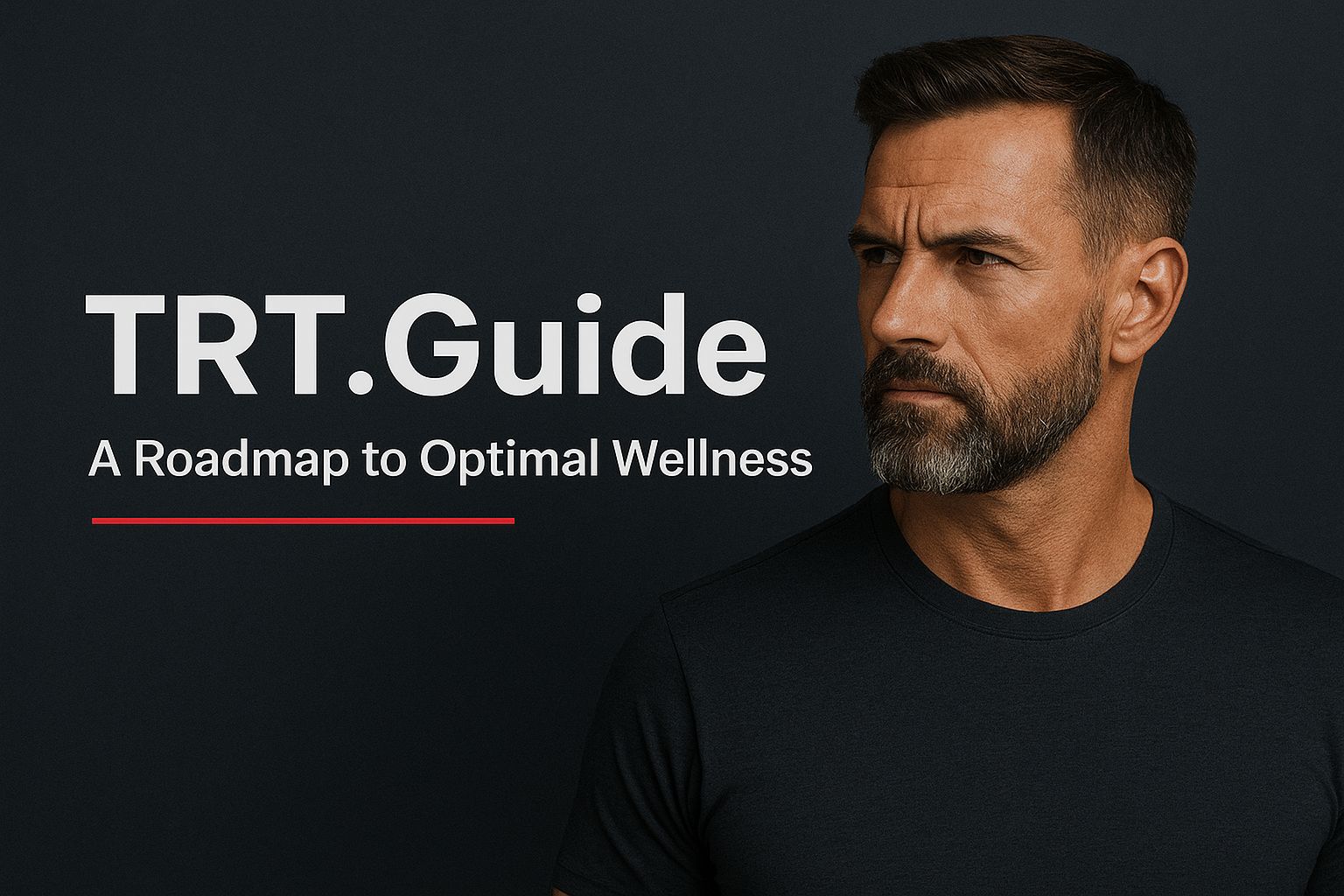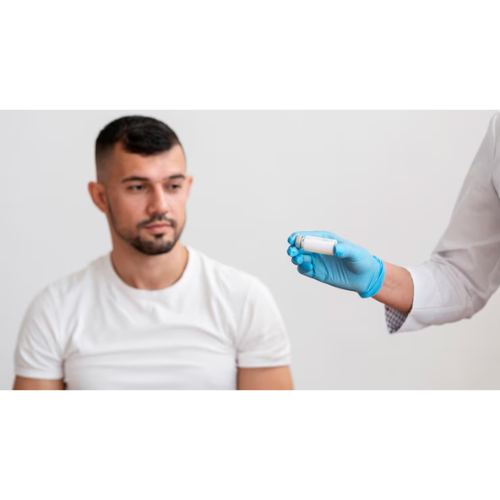Testosterone replacement therapy (TRT) is the chosen course of treatment for men who suffer from low testosterone levels. It can greatly increase one’s vitality, improve mood, and bring the individual to a state of utter well-being. The question that continues to bug most men is the potential of this therapy on male fertility, particularly sperm count. In case you are contemplating TRT as a viable option, then getting to know the correlation between these two factors is quite essential as it guides and ensures that one is equipped with the correct knowledge to make the best decisions about their health.
The entire process of sperm production is dependent on the equilibrium of certain hormones, and the intake of external testosterone can upset this fragile eco-system. It may perhaps seem that the TRT can in some instances lead to the decrease in sperm production. If you decide to understand how shed light on affect the natural levels of your body hormones, you will be able to get to know and weigh well the potential benefits and risks, thus you are able to put your health and family planning goals on the top list.
Overview of Testosterone Replacement Therapy
Testosterone replacement therapy (TRT) is the treatment aimed at solving the issue of testosterone deficiency, the condition that is also referred to as hypogonadism. TRT has different benefits such as it allows the energy level to go high, the mood to be improved, the libido to be stimulated, and the mass of one’s muscles to be better. The methods usually used for the replacement of testosterone include injections, gels, patches, and pellets. Each of these means is for transporting testosterone directly to the blood, and thus the hormone level is back in balance.
Despite being beneficial, there are also associated risks with TRT, particularly on fertility. The majority of the male population is unaware of the effects that TRT has on the key hormonal pathway severely modulating spermatogenesis, i.e., the hypothalamic-pituitary-gonadal axis. Apart from the facts that a new supply of testosterone usually inhibits the naturally produced one, the latter’s production frequency also decreases significantly. The latter depreciation is mainly through the suppression of two main hormones-luteinizing (LH) hormone and follicle-stimulating (FSH) hormone, which are in charge of the testosterone and sperm’s natural generation.
Studies suggest that there is a highly correlated connection between TRT and the decline in sperm count. A clinical trial reported in the Journal of Clinical Endocrinology & Metabolism showed that even after a few months, a 50-60% sperm count decrease was observed in men on TRT therapy. This decline could result in contraceptive failure for those who are planning to conceive.
However, individual reactions to TRT are quite diverse. Several men do not experience changes in their fertility, while others suffer a significant loss of sperm production. Factors determining such differences are the individuals’ ages, the duration of low testosterone, and the chosen mode of TRT.
For men who are using TRT, it is important to monitor their condition very carefully. Regular comprehensive investigations of semen and the endocrine system can give clear indications of the fertility issues associated with the therapy. If the amount of sperm is low, couples should think of ways to be parents.
One of the essential parts of managing the side effects of TRT and its fertility-related problems is to evaluate men’s overall health and reproductive abilities. It is important to personally discuss the pros and cons of different treatments and ways of family planning with a practicing health professional. Once you have surely learned what the positive aspects as well as the potential negative aspects are, then you can make a decision about the testosterone level and the possibility of having children.
Your health, well-being, and quality of life are greatly dependent on one thing: your testosterone levels. In males, the hormone takes on the responsibility of regulating testosterone which in its turn, influences the reproductive system and the fertility of both men and women. What is more, with the help of testosterone replacement therapy (TRT), the body’s physiological processes are altered for the better. This is achieved by changing the secretions of some hormones and thus the man’s health is ameliorated and his reproductive function gets better. The passage gives an insight into the effect of this process on the human body and the making of the sperm.
With no doubt, testosterone is the main male sex hormone that does the job in the human body. In an influence on muscle and bone mass, fat distribution, and red blood cell production, it also holds an important status in the sexual life of men. Besides, it is crucial in the mood, energy, and sexual health.
TRT therapy is adopted to increase testosterone levels, thus it generally reinforces these bodily functions. Unfortunately, the body might nevertheless decide to inhibit its very own testosterone production as a result of the excessive testosterone intake from TRT, or “feedback inhibition” which is similar to a thermostat whereby the temperature setting tells the heater to stop or to start heating. This results in lower levels of luteinizing hormone (LH) and follicle-stimulating hormone (FSH). Such low levels of these two hormones will then also affect the operation of various systems inside the body, particularly fertility.
Role of Testosterone in Sperm Count
One of the most important aspects of sperm production is that testosterone is necessary for normal sperm production. It is the Sertoli cells in the testes that the testosterone produced by the body acts on. Male reproductive systems can be maintained and improved with the help of the cells, leading to the development of the new sperm cells in a process called spermatogenesis.
When synthetic testosterone is the cause of the rise in the testosterone level, your body will react to this change in the normal production of this hormone with the result that you will have even less of πΓê₪LH and FSH. Also, there are sperm production capabilities deteriorated due to the low levels of the hormones.
Impact on Sperm Count
Testosterone replacement therapy (TRT) has a big impact on the number of sperm in the body and the overall fertility. One of the main aspects is the understanding of the results of an array of studies that were carried out.
Research Data that Shows Sperm Count Decline
Usually, the findings of multiple studies show a decrease in sperm count in men taking TRT. For example, a publication in the Journal of Clinical Endocrinology & Metabolism reported a 50-60% reduction in sperm concentration among patients who had been treated with TRT within a few weeks. The authors have also noted that starting testosterone therapy has had a very negative effect on the level of luteinizing hormone (LH) and follicle-stimulating hormone (FSH) which are necessary hormones for the formation of sperm. Within 6 months of this study, nearly 70% of the total number of subjects showed low sperm production, which confirms the negative consequences of artificial testosterone usage in people who seek fertility preservation alongside low testosterone management. This occurs mainly in men.
Research Data that Shows No Marked Change
Other studies, on the other hand, suggest that TRT might not affect the number of sperm in the population under consideration to a very great extent. An article appeared in the Andrology Magazine stated that there are certain individuals who, after beginning testosterone therapy, find their hormone profiles back to normal without any significant effect on the quality of their sperms. Correspondingly, a study echoed these findings that there was neither a surge in sperm count nor that old men [sic] lost their ability to produce children, which means energy appears to be a stabilizing factor against long-lasting hormonal Therapy and disruption of the sperm cycle. Differences between the outcomes could be attributed to differing patient demographics, various doses, and treatment periods, pointing out the essence of individual evaluation. The decision on determining the right testosterone dose while achieving the goal in fertility is a critical factor; hence, the individual outcomes are equally important.
Factors Influencing Outcomes
There are many factors that affect the results of the testosterone replacement therapy (TRT) on sperm count. The comprehension of these aspects can assist you in choosing the right treatment to not only cure your problem but also to maintain your reproductive capabilities.
Age and the Condition of the Patient
Age has a great influence on the way you react to TRT. In most cases the younger males, especially those under the age of 40, experience fewer declines if they undergo some therapy. However, medical illnesses such as obesity, diabetes, and cardiac issues are additional risk factors, which will affect your body’s response to TRT. These diseases will accompany testosterone deficiency, thus infertility would be a possible consequence. Those of you who are younger or suffer from health issues that are mentioned will have to keep making periodic exams of semen for tracking the changes in sperm quality. As well as that, taking care of your health by making proper choices like eating and performing exercises is a major factor in keeping your fertility potential at risk. A good diet and exercise may well be the method of assisting the sperm to improve quality and to avoid the negative impacts of TRT treatment.
Dosage and the Mode of Therapy
The choice of the amount of TRT to be taken and the administration route of this treatment have the most significant influence on sperm numbers and general fertility. Dosage levels that are higher than the physiological limits can cause a considerable decrease in testosterone production levels by natural means. Usually, injections of this drug given through muscle have the greatest, yet sometimes undesirable, effects on the sperm count that is in comparison with the gels or patches that are absorbed through the skin. Your reaction will depend on your metabolism or the need for hormones. It isn’t only important but also essential to adjust the dosage and the method of therapy to the individual at no cost to his/her reproductive potential. The consultations will serve as a tie between the patient and the counselor, as well as the provider, and the patient’s hormonal profile and semen analysis results can be used to make changes, so that everything happens in a balanced way such as maintaining testosterone levels and fertility.
Alternatives to Testosterone Replacement Therapy
If you are concerned about semen count levels and how it may affect your reproductive health, you might want to switch your attention to some alternative kinds of treatments for testosterone replacement therapy (TRT). Here are a few of the available choices:
- Lifestyle Modifications
Lifestyle alteration can boost testosterone level and general health to a great extent. Regular working out, with a special focus on muscle building and high-intensity interval training, which promotes the production of testosterone, is one of the important factors that helps to raise your testosterone level. The diet you keep should be plentiful in vitamins and minerals, e.g. vitamin D, and zinc for the maintenance of hormone levels. Moreover, you should get enough sleep by which you would have targeted 7-9 hours per day, especially for the growth and balance of the hormones.
- Medication Adjustments
Try to negotiate with a specialist in the field that might propose to you some of the non-testosterone drugs that are also to your liking. Clomiphene citrate is an effective drug that serves to release testosterone in men’s testicles and this could help to a large extent one’s fertility. Some studies have shown evidence that clomiphene has the potential to stimulate the growth of sperm and thereby generate more sperm and thus the testis will have more testosterone. The majority of these men could be younger, or have a particular problem with the hypothalamus.
- Hormonal Balancing Supplements
Luckily, there are some nutritional supplements that could help naturally balance one’s hormones. D-aspartic acid, fenugreek extract, and ashwagandha are the ones that have shown some capability in the area of the increase of the hormone testosterone in themselves. If a patient is still not sure about the best way to supplement their diet they need to get advice from a doctor first to know if it is safe and can work for them.
- Manage Underlying Health Conditions
Low testosterone treatment often means handling existing health concerns. Weight, diabetes, and sleep apnea are diseases that lead to low testosterone production and loss of fertility. Dealing with these problems is good not only for testosterone but also for your overall health, which may eventually lead to your body producing enough testosterone in a natural way.
- Counseling and Stress Management
Psychological determinants of testosterone levels might include stress. Furthermore, adopt relaxation techniques like meditation, yoga, or resorting to a therapist that can lend support in keeping the hormonal state. Elimination of stress is a way of decreasing cortisol levels thus stopping it from affecting the testosterone level at the same time.
- Cryopreservation
If you are considering TRT, storing sperm is a good practice before the treatment starts. A storage method such as cryopreservation makes it possible for you to save the sperm for the future, in case your fertility is lost because of the therapy. This decision not only creates a relaxed mind but also gives possibilities of family planning for another time.
It is important to remember that as you are dealing with low levels of testosterone, you should also keep your vigor and fertility. Always seek a medical provider’s advice to plan a treatment regimen that matches your health and family goals.
Conclusion
Understanding sperm count’s relationship with the effects of testosterone replacement therapy is a matter of overall assessment and prudence. While TRT can usher in a lot of positives associated with low testosterone levels, one should have the full knowledge of its possible impacts on fertility. Since the patient’s response to the therapy is person-specific, obtaining personalized evaluations becomes the order of the day.
If you’re thinking about TRT, first consider other options that will help maintain your testosterone levels while not sacrificing sperm production. The decision can be made by having a change of lifestyle and consulting a healthcare provider to find a treatment that will not only maintain but will also improve your health. It is relevant to emphasize that the preservation of your reproductive health is as important as the treatment of the hormonal imbalance. Taking timely measures can ensure that you acquire the same amount of power and sperm that you have now in the future.
Frequent Ask Questions
What is testosterone replacement therapy (TRT)?
TRT is a treatment method in the medical field that is intended to raise the levels of testosterone in men with low testosterone (hypogonadism). It can better the mood, energy, libido, and the muscle mass of an individual thus, enabling them to be vibrant again.
How does TRT affect sperm count?
TRT can bring about a meaningful decrease in the number of sperm present due to the way the treatment interferes with the function of the hypothalamic-pituitary-gonadal axis, normally resulting in about 50-60% less production of sperm shortly after the start of the treatment.
Are there risks associated with TRT?
Of course, the treatment may relieve symptoms of low testosterone, but it can also lower the natural testosterone level and consequently, the user may not be fertile; thus, regular follow-ups and consultation with a doctor become a necessity.
What alternatives to TRT exist for managing low testosterone?
Changes in lifestyle including a balanced diet, exercise and enough sleeping are ways through which people can increase testosterone levels. In addition, medicines such as clomiphene citrate and hormonal supplements have the ability to raise testosterone levels through the stimulus of natural testosterone production without affecting the count of sperms.
Can you tell me if I should do sperm banking before I start TRT?
Yes, sperm banking is recommended for men worried about fertility who want to save their chance of having children before undergoing TRT, that may influence sperm production. Of course, if the condition worsens, then the couple doesn’t have the opportunity to have children.
When is it necessary for TRT to be chosen as the treatment for a man’s health issue?
Deciding if TRT is the right path, it should be a decision for your doctor. They are the ones that will go through your condition, the depression, changes in libido, sleep disturbances and many more, and find out the most suited treatment for you.






